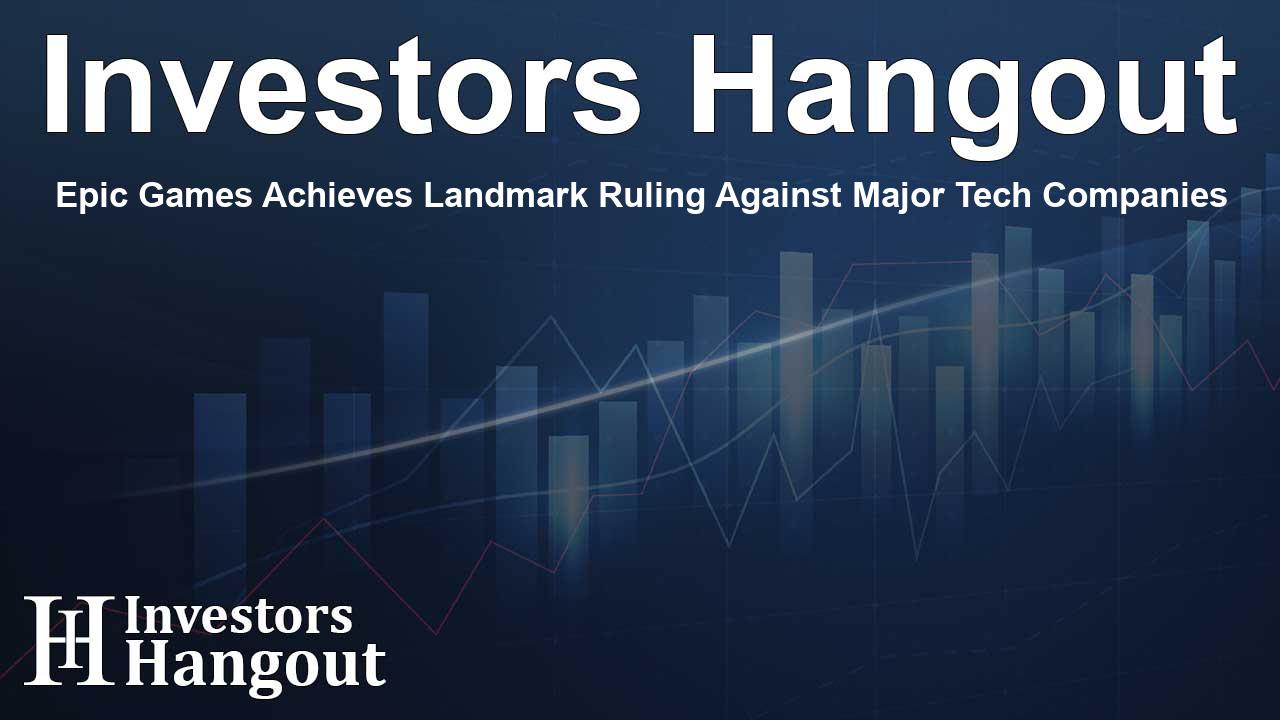Epic Games Achieves Landmark Ruling Against Major Tech Companies

Epic Games Secures a Significant Court Ruling
Epic Games has made headlines recently by achieving a noteworthy victory against tech giants, specifically Apple Inc. and Alphabet Inc. in an Australian federal court. This ruling represents a pivotal moment in the ongoing legal battles surrounding app store regulations and in-app payment systems.
Court’s Findings Highlight Competition Issues
The federal court determined that Apple abused its dominant market position by controlling in-app purchases and preventing users from accessing apps outside of its App Store. This act severely limited competition within the app development landscape. Likewise, the court found that Google’s practices negatively impacted Australian app developers and consumers alike by constraining their options for app distribution and in-app payment methods on Android devices.
Implications of the Ruling
Justice Jonathan Beach stated that the related cases, alongside a class action lawsuit, would be consolidated to streamline the proceedings and minimize redundant witness testimonies. The court concluded that conduct demonstrated by Apple and Google likely reduced competition, a violation of section 46 of the Competition and Consumer Act.
What Comes Next for Customers and Developers?
The court has yet to decide on the specific compensation owed to approximately 15 million consumers and 150,000 app developers affected by these practices. These decisions will come in future hearings, which may significantly alter the financial landscapes for both companies.
Legal Experts Weigh In
Kimi Nishimura, a principal at Maurice Blackburn Lawyers, emphasized the significance of the ruling, stating, "It sends a clear message that even the most powerful corporations must adhere to regulations and acknowledge the rights of consumers and developers alike."
Increased Legal Scrutiny for Major Tech Firms
This ruling adds to a series of legal challenges faced by Apple and Google due to allegations of illegal monopolistic behaviors in their respective app marketplaces. For instance, Epic Games and associated legal teams have claimed that these tech behemoths enforce mandatory use of their own payment systems, which stun developers with fees ranging from 15% to 30%.
Developments in Related Legal Cases
Recent developments indicate that a U.S. appeals court supported a prior ruling that mandates Google to revamp its Play Store operations. This decision represents another significant legal blow against the company, particularly highlighting its anticompetitive practices as deemed by Epic Games.
The Broader Implications for the Industry
Simultaneously, Apple has been navigating its own ongoing litigation and expressed concerns about the potential fallout of similar rulings against it. The company warned that such outcomes could result in "substantial" financial repercussions.
Addition of Further Legal Tensions
Additionally, notable figures like Elon Musk have also recently threatened Apple with immediate legal action, accusing the tech giant of preferential treatment that hinders competition with his AI project. This attests to the rising tensions within the tech industry regarding monopolistic practices and accountability.
Market Reactions and Trends
In terms of stock performance, Apple has seen a decline of about 6.84% year-to-date, while Alphabet, on the other hand, has experienced a slight increase of 5.77%. Such fluctuations in stock values reflect the market's reaction to these high-stakes legal matters.
Frequently Asked Questions
What was the outcome of the court ruling against Apple and Google?
The court ruled that both companies engaged in practices that limited competition, violating Australian competition laws.
How many consumers will be compensated as a result of this ruling?
Approximately 15 million consumers and 150,000 app developers may receive compensation, though specific amounts are yet to be determined.
What major issue did Epic Games highlight against Apple and Google?
Epic Games accused both companies of monopolistic behaviors that force developers to use their payment systems, thereby diminishing competition.
How has the legal landscape altered for Apple and Google following these developments?
These ongoing legal challenges could compel significant changes in how both companies operate their app stores and handle payment systems.
Why is this ruling significant for app developers and consumers?
This victory signals that large corporations must comply with competitive practices, potentially leading to more choices and better pricing for consumers and developers alike.
About The Author
Contact Addison Perry privately here. Or send an email with ATTN: Addison Perry as the subject to contact@investorshangout.com.
About Investors Hangout
Investors Hangout is a leading online stock forum for financial discussion and learning, offering a wide range of free tools and resources. It draws in traders of all levels, who exchange market knowledge, investigate trading tactics, and keep an eye on industry developments in real time. Featuring financial articles, stock message boards, quotes, charts, company profiles, and live news updates. Through cooperative learning and a wealth of informational resources, it helps users from novices creating their first portfolios to experts honing their techniques. Join Investors Hangout today: https://investorshangout.com/
The content of this article is based on factual, publicly available information and does not represent legal, financial, or investment advice. Investors Hangout does not offer financial advice, and the author is not a licensed financial advisor. Consult a qualified advisor before making any financial or investment decisions based on this article. This article should not be considered advice to purchase, sell, or hold any securities or other investments. If any of the material provided here is inaccurate, please contact us for corrections.
